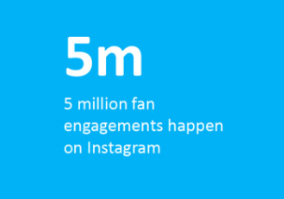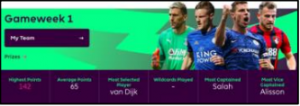Numbers speak louder than words



After the opening weekend of the English Premier League season 5.8 million fans will be logging into Fantasy Premier League to see how their teams performed. With 94 points my team was ranked 155,035 which is just inside the top 3%. If I am still in the top 5% at the end of the season it will be a good year as my ‘other’ team, Newcastle United, will not finish in the top 5 of the Premier League!
Be
One of the side effects of a new season is the plethora of data and insights that filter out from research agencies, media and fanzines shedding light into the football business. As 12 weeks of transfer activity drew to a close last week, 20 Premier League teams spent a combined £1.41 billion on transfers, just short of the record £1.43 billion spent in 2017, according to Deloitte. Orbis Research estimated the global fantasy sports market to be worth $14 billion in 2018. And, according to Peninsula, a HR specialist, 62% of workers found participating in a league
boosted their morale. However, this should be considered in light of reduced productivity as employees spend an average of 6.9 hours per week working on their fantasy team during office hours according to fintech startup OppLoans.
Not to be outdone by the flurry of investment in footballers, The Athletic, an American sports website launched a UK site, dedicated to the beautiful game. According to the Financial Times, 44 writers from national and local newspapers and the BBC decided to make the switch. The value proposition to  football fans is a “no ads, no clickbait” subscription with high quality content for each of the 20 Premier League clubs and not just the “big 6”. At £59.99 per year it remains to be seen whether fans will vote with their loyalty to leading writers such as Daniel Taylor and Oliver Kay or keep their digital wallets firmly in their mobiles and feed-off numerous other
football fans is a “no ads, no clickbait” subscription with high quality content for each of the 20 Premier League clubs and not just the “big 6”. At £59.99 per year it remains to be seen whether fans will vote with their loyalty to leading writers such as Daniel Taylor and Oliver Kay or keep their digital wallets firmly in their mobiles and feed-off numerous other
platforms and content distributors.
With data being thrown around like confetti, it is easy to be misled by some of the reports but others who remain objective and provide context like Newton Insight are quite refreshing and useful. On the surface, 2.8 billion fan engagements with all 20 Premier League clubs does not say much. But, an increase of 52 million fans through
global social networks in 2018 or a 13% increase is more tangible. This equates to some 140,000 new fans per day. More interestingly, 25 million of these were acquired via Instagram which is the main platform driving growth and engagement.
It was news to me but Manchester United only launched their official YouTube channel in February 2018 and now have 1.9 million subscribers, equal to rivals Manchester City but behind Liverpool FC with 2.7 million. City has seen fastest growth on Facebook with 7 million new fans which is more than 50% of the total growth of all Premier League Clubs. Collectively the Premier League clubs generated 720  posts per day which is one post every two minutes. From a brand or sponsor perspective, selecting a ‘football partner’ may be coloured by some personal preferences but from a business perspective, reach and ability to engage with a specific audience should be objective. If your market is Liverpool, it might be worth knowing that it takes Liverpool two days to add 10,000 followers on Facebook compared to two months for Everton. Or in China, Tottenham were adding 10,000 followers on Weibo every eight days compared to 33 days for Arsenal. In 2017 this statistic was reversed. And, not to forget other clubs, Huddersfield were leading the way in social media with 11,000 posts in 2018!
posts per day which is one post every two minutes. From a brand or sponsor perspective, selecting a ‘football partner’ may be coloured by some personal preferences but from a business perspective, reach and ability to engage with a specific audience should be objective. If your market is Liverpool, it might be worth knowing that it takes Liverpool two days to add 10,000 followers on Facebook compared to two months for Everton. Or in China, Tottenham were adding 10,000 followers on Weibo every eight days compared to 33 days for Arsenal. In 2017 this statistic was reversed. And, not to forget other clubs, Huddersfield were leading the way in social media with 11,000 posts in 2018!
As with most things in football, marketing and business, it is quality not quantity which counts. Once again, research reveals it takes only 45% of output through social media to gain 80% engagement with the fan base. Facebook still has the biggest Premier League fan base with 260 million, YouTube is the fastest growing at 77% but Instagram has the highest share of fan engagement at 69%. Knowing all these figures does not guarantee success off the pitch for the clubs and partners. Fans are becoming more transitory than ever. In Indonesia winning teams are so highly admired that 44% of fans switched allegiance. Some 55% of young fans expect music to be part of their football experience. And, 82% of under-18 Premier League fans say their favourite player does not play for their preferred club, according to research from sport and music marketing agency, Ear to the Ground.
If there is one simple conclusion, football is no longer just about numbers. It is a multi-cultural, multi-channel and multi-faceted lifestyle experience. Believe anything else and you are living in fantasy land.